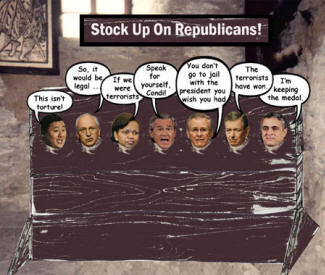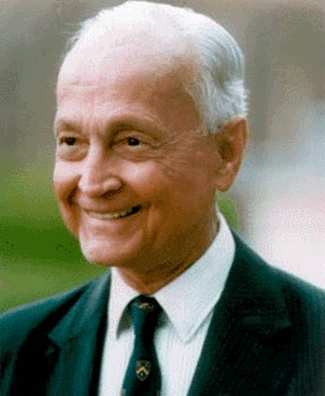PEOPLE ECONOMICS, by Charles Carreon09/01/08
“When the people's hearts are won by friendship, they undertake hardship willingly, and even lose the fear of death, so great is the power of joy over men.” The Book of Changes, Chapter 58, “Joy.”
Keep Your Eye On the Invisible HandAdam Smith was one of the first economists, and those who feel that the government should stay out of labor relations, or at least refrain from supporting the goals of workers and restrict itself to benefiting industry, often claim to quote Adam Smith. They say Smith’s “invisible hand of commerce” will guide the operations of the economy, setting prices for labor, food, and commodities, making wage and price controls such as those Nixon imposed, completely unnecessary and totally objectionable.
Smith's invisible hand makes no distinction between licit and illicit trade, and for years kept the retail price of a quarter-ounce of marijuana at parity with an ounce of gold, and provided johns with twenty-dollar prostitutes and prostitutes with twenty-dollar bags of heroin. All things work together for good in this best of all possible worlds, as Voltaire's Dr. Pangloss would say. Your average person’s knowledge of Adam Smith usually stops at this level, but Smith’s massive work, An Inquiry Into The Nature And Causes of The Wealth of Nations, does not exhort us to have faith in an invisible hand that will adjust our economic fortunes into the black, but rather advises us to watch the movement of labor, goods, and money to learn how people adjust prices and engage in trade.
People Create WealthPeople, not an invisible force, drive production and trade. Smith’s metaphor was meant to turn attention to the rather amazing characteristics of the marketplace, much as modern scientists have pointed out the marvelous operations that the planet and living beings perform without conscious thought. It is true that Smith was sanguine about the coexistence of poverty and wealth in a single society, and saw no inherent evil in an economic order that he could describe thus:
“Among civilized and thriving nations … a great number of people do not labour at all [but] consume the produce of ten times, frequently of a hundred times more labour than the greater part of those who work; yet the produce of the whole labour of the society is so great, that all are often abundantly supplied, and a workman, even of the lowest and poorest order, if he is frugal and industrious, may enjoy a greater share of the necessaries and conveniences of life than it is possible for any savage to acquire.”
One would certainly agree that today many consume hundreds or thousands of times what one other person can produce – a fast-food worker working all day in Los Angeles would be unable to even pay for a day’s worth of parking that an executive would simply put on an expense account. It is also true that Ray Kroc, the popularizer of the McDonald’s fast-food system, got his big idea when he was but a traveling salesman selling milkshake mixers in Southern California, so he may very well count as a “frugal and industrious” workman who rose to “enjoy a greater share of the necessaries and conveniences of life.” But Smith’s positive attitude toward disparity of wealth is not the point of his book, and he is well aware that government policies affect the occupations and prosperity of nations and their citizens:
“The policy of some nations has given extraordinary encouragement to the industry of the country; that of others to the industry of towns. Scarce any nation has dealt equally and impartially with every sort of industry. Since the downfall of the Roman empire, the policy of Europe has been more favourable to arts, manufactures, and commerce, the industry of towns; than to agriculture, the industry of the country.”
A good example of differing policies toward similar industries might be the US government practice of licensing industrially-produced narcotics manufactured by pharmaceutical giants, while simultaneously fighting a “war on drugs” by spraying toxic materials on coca crops in Colombia and Bolivia, while simultaneously pumping new life into the opium economies of Afghanistan and Pakistan, resulting in a fresh flow of powerful Asian heroin into our nation.
The new president of Bolivia wants to legitimize coca growing and use of the native plant, that has no more harmful effects on the native population than tea has on the English. He says it can be used to make soap, toothpaste, herbal remedies, and many other useful substances. Dr. Andrew Weil, the new age doctor whose paunchy good health is now advertised from a thousand Sunday magazines, once suggested we substitute coca chewing gum for coffee. Of course, in the US, we’d have people buying a thousand packs of gum, soaking them in a bathtub, washing the result with gasoline to extract the cocaine, and blowing up their house and kids trying to get a buzz. As Adam Smith might say, some people are just savages.
Everything Has Its PriceHaving dispensed with the idea that Smith’s Invisible Hand is predestined to provide benefit for humanity, or that it will do the work of wholesome laws made by ethical politicians with the approval of informed citizens, we can move on to what Smith was really saying. Smith’s thesis is that the cost of goods is established by the cost of the labor required to produce them. Nothing has an intrinsic value. Everything is priced according to how much it costs to get a skilled person to produce it.
Gold and Oregon green bud remained at parity for a long time because it cost a similar amount of money in labor to employ poor blacks at starvation wages in South Africa to produce, smelt and ship bars of gold as it did to employ hippies (not very hard workers, but willing to risk getting arrested and to be paid in product) to grow a finicky psychoactive weed in a secret location someplace near Williams, Oregon, and smuggle it to San Francisco. Take note, however, that gold lasts forever unless you lose it down a rathole, and cannabis must be consumed to extract its value, and will become worthless after a couple of years. So you might argue that cannabis is far more costly, since your ounce of gold will last a lifetime, but your bag of pot will be empty next week.
Raiders of Others' LaborNow that more Indian and Chinese people are getting into the middle class, they are buying more gold for marriage ceremonies, there is greater demand for gold, apartheid is over in South Africa, and people are getting paid a wee bit more to extract gold from the earth, and of course, people who think the dollar is going to sink in value want to buy “hard money.” The notion that gold has a fixed value is, however, utterly mythical. During the “Age of Gold,” Spain and Portugal stole so much gold from the Incas and Aztecs that they flooded the European economy with the damned shiny stuff, reducing its value to one-third, much to the chagrin of other European nations, who found their existing stock of gold ever shrinking in value as the conquerors of the New World became the dominant players in the precious metals market. Spanish gold was cheap, please take note, because they didn’t pay for it – they stole it – so it didn’t reflect the cost of feeding, clothing, and managing the dead Incas and Aztecs whose wealth was thus acquired.
Stealing from other nations is what one anthropology professor of mine called “a raiding economy,” such as was traditional among the Apache Indians of Arizona and Sonora. Once they got horses from the Spanish, who had introduced the whole concept of mounted cavalry to the New World, they started raiding other, richer tribes, and their mounted warriors were skilled at scooping up a goat, a child, or a bag of corn with equal facility while marauding through a little village full of squash-growers. Labor costs are affected by many factors, and different “nations” require people with different skills. A farmer would have fared badly in an Apache tribe, but would be appreciated by the Hopis, who moved way up on high mesas to avoid raiders, and there skillfully collected water in cisterns to feed small irrigated plots of beans, corn and squash using unique methods of dry-farming. Interestingly, the Apaches have adapted to the ways of the white invaders better than most tribes, as their facility on horseback and indisposition to surrender gave them a leg up in the larger economy, and many tribes adopted ranching, farming and logging when they were forced to give up raiding.
Of Brickmakers & WoodcuttersThe productivity of a community is enhanced, Smith explained, as people become more skilled in particular productive activities. This is called the “specialization of labor” to exploit “the relative advantage” of different workers. Exploiting “relative advantage” can be illustrated by the story of two couples with different skills. The first couple was Jane and Wanda, two lesbian brickmakers. The second couple was Jeff and Sally, two heterosexual woodcutters. Since they enjoyed each other’s company, the two couples at first decided to work Mondays, Wednesdays and Fridays on brickmaking, and Tuesdays, Thursdays and Saturdays cutting wood. After about a month they took a tally of the bricks and the cords of wood produced, and discovered that they had produced both less bricks and less firewood than when the two couples worked separately. Why? Jeff and Sally were unskilled at making bricks, so they made errors, and Jane and Wanda had to spend time training them, and even then the hetero couple didn’t produce as many usable bricks. The same result occurred when the lesbians tried to cut wood. They weren’t as good at it as Jeff and Sally, and due to their inexperience, produced less wood at greater cost in time. Facing the possibility of not having enough bricks to build the house or enough wood to get through the winter, the two couples focused on what each was best at, and in the end there were not only enough bricks and firewood for their personal use, they had some left over to sell. Eventually, Jane and Wanda adopted some war orphans that they turned into a tribe of little brickmakers, and Jeff and Sally gave birth to several children who were handy with the saw, loved the smell of the woods, and branched off into reforestation. A few generations later, the two couples were barely remembered, but their wise choices left a legacy of brick homes and leafy avenues in a town where sexual inequality was a forgotten memory.
Modern UnderemploymentIn the story of the brickmakers and woodcutters, everything is happy, because workers specialize by choice to their greater communal benefit. Of course, this is not how it works in the real world, where people no longer follow the traditional occupations of their parents, and acquire few specialized skills besides what are gleaned from channel surfing, playing video games, driving dad’s car, and purchasing fast food. Most young people are losing specialized abilities like cooking, sewing, and gardening, that help them keep expenses down. The value of acquiring a standard credential like a high school diploma has become vague to many young people. College degrees are very costly to procure, and employers increasingly doubt that college graduates have the skills needed. Top hourly wages in our techno-driven economy go to people with certifications issued by private computer companies like Cisco, Microsoft, and Novell, not to college graduates. The old question, “What do you want to be when you grow up?” is now impolite to ask, since it is likely to throw the child into a quandary that, parents fear, will cause anxiety. Besides which, how could a child be qualified to decide that he wants to be a Linux networking specialist until after he hacks his way into the school network to change his girlfriend’s biology grade? Experiences guide choices, and in this world, choosing what type of labor to specialize in often defaults to “whatever someone will pay me to do.” Which explains why the price of marijuana keeps dropping.
A Bull Market For SoldiersThe disconnect between young people and gainful employment explains why the sudden desire to go open a can o’ whupass on them Arabs took root so quickly in the apocalyptic soil of the unemployed, working-class young people in this country. There was a genuine crisis on hand, fueled by the public murder of over four thousand people in downtown New York. There was a charismatic president leading the nation, there was a fire in the desert, a Holy Grail to chase, and a lot of people wanted in. Money was easy to get in Iraq. In fact, huge stashes of bundled hundred-dollar bills were left completely unguarded, and uncounted billions have gone missing. War is good business, especially when the Vice President is still getting a $300,000 annual payment from Halliburton, the prime no-bid contractor on the project to level Iraq under the guise of nation-building. The invisible hand is working overtime these days.
Two billion dollars have been spent developing and deploying technology to block increasingly sophisticated cell-phone-detonated bombs in Iraq. People often say “think what that would have done if spent on schools.” But they don’t say it when the nation is “at war.” Typically, too much is being claimed for the use of this term, “war.” Certainly the nation isn't at war like it was in World War II, when it entered a two-front war against two industrial giants that had defeated all of Continental Europe and the South Pacific. Certainly it isn't a war like Vietnam in 1968, when the American death toll topped 40,000, everybody was buckling down in school to avoid being drafted, and ultimately the draft became a negative lotto game where the unlucky ones got picked out of a hat, and student or no, it was time to go. The nation is “at war” because the president said it was. “Being at war forever” has officially become our policy, and like all other policies, it is an economic policy.
Since we are at war, money goes first to guns, then to butter for the soldiers, then to pay for the creation of a gigantic, unwieldy security apparatus to strangle the airline industry, then to pork-barrel projects necessary to grease all of the palms that wrote the campaign checks and bought the dinners and paid for the trips that a Congressperson just can’t live without. If the sleaze of politics seems far from you, be assured it is not. The wages that never go up, the jobs that cannot be found, the housing that isn’t available, the opportunities that don’t appear, have all been swallowed up by a national economic policy that is far more monstrous than one would think from watching TV. Some folks don’t believe in conspiracies. Okay, we’ll chalk it up to the work of the invisible hand.
Money vs. GoodsNo one is going to advocate the end of money if they are sane, because money is the most amazing thing in the universe – it is the equals sign between anything and anything. Using “money,” we can put a value on anything from apple pie to a course in Zen, and the price will always be based on how much it costs to produce the product. It may be more charming to pay for Zen in apple pies, but most Zen masters want cash, because using money, they can buy whatever they want. The flexibility of money makes it useful, but it doesn’t give it any intrinsic qualities of value. A lot of the time we think we want money, and forget that ultimately, we want what money buys. We usually don’t think about this until we go out looking for a midnight snack, and unable to find a grocery store open, return home with gratitude to find a single ice cream bar stuffed in the freezer.
Nevertheless, the vast majority of exchanges are going to be facilitated by money, including, ironically, the establishment of social policy to expand productivity beyond the monetary realm. There is a cost for everything, including an economic policy to increase real wealth among the citizens. The calculation of wealth goes beyond tallying dollars, because one may be wealthy without having a dollar, like an eccentric hermit living happily in a distant location, tending a garden and feeding the birds. Wealth, distinct from money, is an abundance of what we want and need. If our community priorities are straight, we will strive to become rich in essential goods like clean air, fresh water, arable land, inspiring housing and livable towns. We will give people an incentive to increase the wealth of knowledge and skills they carry within them, so we can have excellent teachers in our schools, skilled medical care for those in ill health, and media resources that foster communication in an environment of free thought. These things usually cost money, because people create them, but they can be created and exchanged without money, and can enrich us concretely and directly, giving us more of what makes life worth living.
Money-Free ExchangeLeaving money out of the equation, we still have our skills and creations to exchange, but we lack a “medium of exchange.” A medium of exchange is used to reduce what economists call “transaction costs.” Transaction costs are evident in all activities. Take sending someone a letter. It involves the following transaction costs: time spent writing the letter and addressing the envelope, plus the expense of a piece of paper, a stamp, the time it took to buy the stamp, the time you’ll spend mailing it, and a few days waiting time for your recipient to receive it. The telephone reduces the human transaction cost of having to write the letter, which blocks innumerable communications from taking place. Email reduces the transaction costs greatly, but only at the cost of knowing how to use email and getting access to a machine with Internet. Transaction costs prevent communications and productive exchanges from taking place.
Markets are intended to overcome transaction costs by having everyone bring their product to the same place, so a purchaser can visit many merchants at once. Nowadays, markets have migrated online. Everyone is getting in on the action. Myspace is a marketplace for attention. Craigslist is a marketplace for sex, according to the cops. eBay is a marketplace for people who are willing to take risks to get a bargain, and for many legitimate sellers, as well as for scammers looking to turn over questionable goods.
When we remember that money is but a mechanism for equating one person’s labor to another, we may intuit something clever – we don’t need US Treasury Notes to keep track of people’s labor. We can record their relative work outputs in a spreadsheet or other database, or even on a piece of paper. Strictly speaking, that is all the banks are doing anyway, and people who move large amounts of money around are well aware of this. Computers allow us to create and manage databases quite easily. Your paycheck is only good if your boss’s account has enough money in it, which is to say, it appears to have enough money in it when the bank teller looks on her screen. What is handy about the designation of your labor as money is that anyone else will take it in exchange for their goods and services. What is not handy is that you can’t get enough of it to do everything that you want to do.
People will trade for what they could not pay for with cash. Why? Between rent, gas, food, insurance, child support and a DUI diversion, there’s no money available. Statistically, an over-forty male who is strapped financially runs a high risk of gambling away the last of his money on video poker or whatever lottery system his jurisdiction uses to snooker him out of his hard-earned cash. Instead of pecking at a screen like a pigeon, a guy in this situation might wisely choose instead to spend his time sawing boards and pounding nails – building stuff for a friend in exchange for some goods or skills. Skills and goods exchanges allow a community to grow more wealthy by consuming its own local products and employing its own people. Local skills and goods trading improves individual living standards, gives young people a chance to apprentice in a non-wage environment, and allows community members to preserve cash resources by reducing reliance on money.
Money developed based upon exchanges of concrete trade items or particular services, and was used to facilitate exchanges, not to monopolize the means of exchange. Where economic squeezes by national governments and international bankers impose embargoes and sanctions, barter can keep national economies alive. For example, Venezuela ships oil to Cuba, that sends back medicines, doctors and teachers. Thus Venezuela supplies Cuba’s energy needs, and Cuba helps Venezuela care for the education and health of its people, and they both get the satisfaction of telling Uncle Sam to pound sand.
Historically, people in love have exploited their relative advantages by dividing labor along classic sex-role lines, and family life has been the great factory of non-monetary wealth-generation. People used to routinely help each other build a house, then spend a lifetime washing clothes, making and raising babies, cooking food, growing gardens, fixing cars, chopping weeds, all that stuff. Some relationships are very elevated transactions that produce works of art that humanity will enjoy forever, like the music of Chopin and the writings of George Sand, or the sculptures of Camille Claudel and Rodin. For this and many other reasons besides producing soldiers for the fatherland, society has for a long time made it a legitimate social and governmental goal to make it easier for young people to get married, have children, live productive lives, and contribute to the life of the community. Skills and goods exchanges can be great resources for young people who have the energy and motivation to help themselves by working for others, because they benefit three ways – connecting with creative people, learning skills, and getting something valuable from their labor.
Skills and goods exchanges between individuals don’t happen on our local level mainly because there’s little thought given to non-monetary exchanges, and no place is dedicated to making them happen. There is no forum that is specifically focused on facilitating skills and goods exchanges within our community, and thus money is virtually the only avenue for trade in goods and services. Particularly at a time when the capital for business development is so difficult to obtain, our communities would demonstrate vision by establishing a local skills and goods exchange database, available online and in a walk-in office open to the public.
Only Labor Can Save UsThe national infrastructure is collapsing. Schools are underfunded, while teachers are being laid off. Bridges are falling down, and there's no money to fix them. Hospitals can't serve the sick, and doctors can't get paid. This is because money has taken over our minds, and we no longer understand how to cooperate without it. Can you imagine if a mother wouldn't move from her chair to feed her child because the child had no money to pay her? Of course not. Money is not the issue in that relationship. Similarly, money does not have to be the issue in all kinds of relationships. We see this when natural disasters strike – neighbors stop what they're doing, and help each other move out of harm's way – not because they're paid, but because it's the right thing to do. People get “free” labor in this way, and no one ever sends a bill. In fact, they spend the rest of their lives remembering that it was something they never regret having done – working for free. Indeed, only sick-minded people try to turn a profit when a hurricane or a forest fire is consuming their community.
Well, guess what? The whole planet's on fire, and it's time to put humanity's shoulder to the wheel. If money is available, it can be used to build a community, because it commands the power of human labor. But idealism, and wise cooperation, can also mobilize human labor, drawing on deep resources that cannot be tapped by spending money.
Welcome To People CityA community, let's call it “People City” for ease of discussion, could adopt policies that would vitalize its citizens by valuing their labor in a system not driven by money. How could People City do this? People City could first explicitly declare that its primary asset is its people, and that the care, cultivation and development of their welfare, wealth, and well-being are the primary concern of its leaders. People City could establish a skills and goods exchange, using City offices and technological resources to increase non-monetary economic activity. People City could establish grants and subsidies to supplement the efforts of gleaners, food banks, and homeless shelter-providers, who are distributing actual wealth to those in need. People City could reach out to older people who have extra time to contribute, and young people who have no contact with community elders, providing space where they can share skills, stories, books, and the history of their community. People City could adopt a purchasing and hiring policy that requires giving first consideration to local goods and service providers in all City purchasing decisions.
People City could analyze its patterns of consumption and production, and its leaders could make the information publicly available, so that local businesses would know how to orient their productive efforts to stimulate the local market. People City could begin to educate the students in its schools to understand the economic structure that sustains them. People City could elevate civic leaders who address the needs of citizens, and dismantle voting systems driven by media pressure and special-interest influence. People City could demand that banking, real-estate, and industry actually provide services that do more than percolate money upward to themselves, and accomplish the purpose that money is meant to accomplish – motivating people to labor for our overall social benefit.






